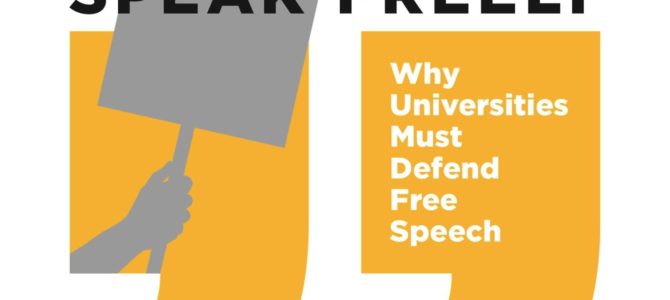
Free speech is fundamental to the modern university. But polls of college students and campus protests meant to silence dissenting views at Claremont McKenna, Middlebury, Berkeley, and other schools across the country show that many of today’s undergraduates think free speech isn’t all it’s cracked up to be. It may even make them feel unsafe.
Princeton Professor Keith Whittington’s new book, Speak Freely: Why Universities Must Defend Free Speech, is a welcome antidote to the worst of campus politics and a reaffirmation of what makes universities great. It details the purpose of the modern university, why free speech is fundamental to that purpose, and what we stand to lose if we allow the campus mob to have its way. This year, every entering freshman at Princeton is required to read it, and other universities would do well to assign the same to their students.
According to Whittington, the purpose of the modern university is, at its best, “the task of gathering, preserving, and advancing human knowledge not for the sake of achieving some other goal, but for its own sake.” What comes after, from cures to diseases, to new products, to informed citizens capable of meeting the demands of a democratic society, are all vital. But they are still secondary to that core purpose, which makes everything else possible.
Historical Warnings
Why is freedom of speech important? It is more than a pleasant (or unpleasant) add-on. It is “constitutive of a modern university because the principles of free speech are tools critical for sustaining the project of intellectual inquiry that expands our knowledge and conveys that knowledge to others,” observes Whittington.
To warn against the dangers of those who would silence speech by force, Whittington uses Thomas Jefferson’s experience in the early republic as a member of the opposition, and in particular the example of the Sedition Act. The Sedition Act made it a “federal crime to publish or say anything ‘false, scandalous, or malicious’ that might bring the federal government or federal government officials into ‘contempt or disrepute’ or excited against them ‘the hatred of the good people of the United States.’”
The Federalists used their powers under the Sedition Act with abandon, jailing Jeffersonian writers and publishers who opposed their policies. In their quest to punish purveyors of fake news, these officials chilled even truthful speech, demonstrating that “the only safe way to protect the powerless was to bar anyone from punishing speech.”
Likewise, shutting down free speech on a university campus will not necessarily prevent the spread of bad ideas, but instead will likely only allow the ideas of the powerful and the established to get a hearing.
Humility, Arrogance, and Conviction
The second case against censorship and for free speech comes from John Stuart Mill, whose arguments in favor of free speech Whittington divides into three: an argument from humility, an argument from arrogance, and an argument from conviction.
The argument from humility starts from the same place that the Jeffersonian argument begins: Human beings are fallible. As Mill reminds us, “to refuse a hearing to an opinion, because they are sure it is false, is to assume that their certainty is the same thing as absolute certainty.” It is incumbent upon us all to recognize that we might be wrong, and that it is possible that others might be right, or at least have some useful points to make that can get us closer to the truth.
The argument from arrogance follows closely from the argument from humility. If we arrogantly believe that we are correct, and so silence those who question us, we deny others the chance to make up their own minds about what is true. Not only are we done a disservice by the silencing of voices, as the argument from humility states, if we happen to be wrong, the whole community is worse off because of our arrogance.
Finally, the argument from conviction states that “the only way we could be confident in our own opinions is if we have seen them weather serious challenge.” An unquestioned thought “is but one superstition the more, accidentally clinging to the words which enunciate a truth.” It is not the role of a university to promote superstition.
Offenses on Both Sides
Having made the theoretical case for both the ends of the university and the importance of free speech to those ends, what follows is a useful history of and guide to many of the contemporary debates that have shaken academia.
Before they arrive on campus, many incoming freshmen will not have heard of trigger warnings, safe spaces, hate speech, invited controversial speakers, and the methods of protest currently being deployed on campuses. Whittington’s book explains all of these and where they are sound in theory and often bad in practice. For instance, some students really do have PTSD and may need warnings on content that could recall trauma. But warnings should never be used to shut off realms of intellectual inquiry.
Readers from across the political spectrum will also appreciate that, although Whittington describes himself as a “Texas populist,” he calls out offenses on both sides, despite the fact that, in most disciplines, those in power on campus amongst students and faculty are overwhelmingly on the Left.
To demonstrate his point, Whittington recalls leftists at Claremont McKenna College who disrupted Heather Mac Donald’s speech because of her views on policing in America, as well as Virginia Commonwealth University, which tried to ban the Gay Alliance of Students in the 1970s.
As Whittington argues, “the modern university is one of the great achievements of Western civilization.” The stakes involved, therefore, are high. Whittington’s case is not just that colleges and universities should protect free speech because of the requirements of the First Amendment. They should do it because to deny free speech would be to fundamentally alter their reason for being.









